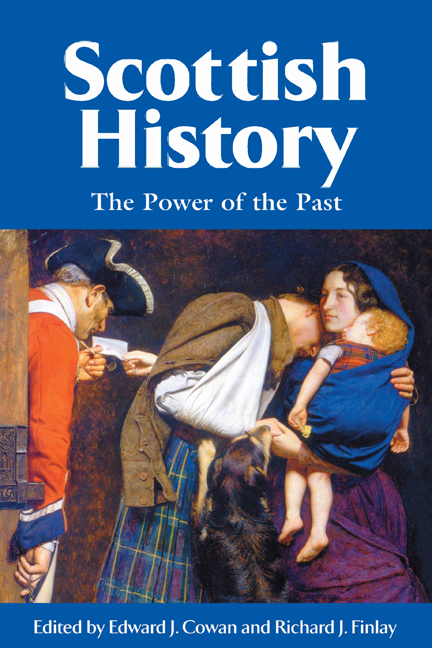Book contents
- Frontmatter
- Contents
- Contributors
- Introduction
- 1 The Picts‘ Place in the Kingship's Past Before John of Fordun
- 2 The Demonisation of King John
- 3 Late Medieval Scotland and the Matter of Britain
- 4 In Search of the Scottish Reformation
- 5 Civil Society and the Celts: Hector Boece, George Buchanan and the Ancient Scottish Past
- 6 The Covenanting Tradition in Scottish History
- 7 ‘What's in a Name?’: Pedigree and Propaganda in Seventeenth-Century Scotland
- 8 The Ideological Uses of the Picts, 1707-c.1990
- 9 The Jacobite Cult
- 10 Queen Victoria and the Cult of Scottish Monarchy
- 11 ‘Their Laurels Wither'd, and their Name Forgot’: Women and the Scottish Radical Tradition
- 12 Tomorrow's Ancestors: Nationalism, Identity and History
- Index
1 - The Picts‘ Place in the Kingship's Past Before John of Fordun
Published online by Cambridge University Press: 24 September 2020
- Frontmatter
- Contents
- Contributors
- Introduction
- 1 The Picts‘ Place in the Kingship's Past Before John of Fordun
- 2 The Demonisation of King John
- 3 Late Medieval Scotland and the Matter of Britain
- 4 In Search of the Scottish Reformation
- 5 Civil Society and the Celts: Hector Boece, George Buchanan and the Ancient Scottish Past
- 6 The Covenanting Tradition in Scottish History
- 7 ‘What's in a Name?’: Pedigree and Propaganda in Seventeenth-Century Scotland
- 8 The Ideological Uses of the Picts, 1707-c.1990
- 9 The Jacobite Cult
- 10 Queen Victoria and the Cult of Scottish Monarchy
- 11 ‘Their Laurels Wither'd, and their Name Forgot’: Women and the Scottish Radical Tradition
- 12 Tomorrow's Ancestors: Nationalism, Identity and History
- Index
Summary
We are accustomed in modern scholarship to regard the Picts as part of Scotland's history, even if there is disagreement about what part should be attributed to them. Isabel Henderson, the most distinguished scholar of Pictish studies of her generation, has remarked that ‘if we Scots like to think of ourselves as something distinct from an Irish colony then it is the spirit of tribes who went to make up the Picts that we must invoke’. It may seem obvious, therefore, that any vision of Scotland as an anciently distinct and independent entity would naturally seek to give prominence to the Picts.
This is not, however, what is found in the earliest extant documents in which the kingdom's claim to an ancient freedom was proclaimed. The most prominent among these is the magnificently confident and cogent defence of Scotland's independence written by the Scottish procurators at the papal curia in 1301, led by Baldred Bisset. This text, known as Bisset's Processus or ‘Pleading’, was written in response to the case put to the papacy by Edward I to justify his overlordship over Scotland, in which Edward famously resorted to a somewhat partial account of the legend of Britain's primeval division among the sons of Brutus, including Albanactus, eponym of Albany (i.e. Scotland). Alongside this should be considered the text (or, rather, two closely related texts) known misleadingly to posterity as the ‘Instructions’. These were once regarded (improbably) as versions of a single text in which the Scottish government relayed detailed instructions to its procurators at the Curia. They have now, however, been identified by Donald Watt as the Scottish procurators’ initial responses to the English case, providing much of the raw material for the cogent eloquence of Bisset's ‘Pleading’. Watt has suggested therefore that these should properly be referred to as the ‘Objections’. The significance of the ‘Objections’ is that it enables us to glimpse the Scottish procurators at work as they fashioned a case for Scottish independence that would be announced in the most important legal and political forum in Latin Christendom.
Because Edward I had brought the ancient past into play, the Scottish procurators were bound to articulate an opposite view of origins and early history which would justify Scotland's independence.
- Type
- Chapter
- Information
- Scottish HistoryThe Power of the Past, pp. 11 - 28Publisher: Edinburgh University PressPrint publication year: 2020



